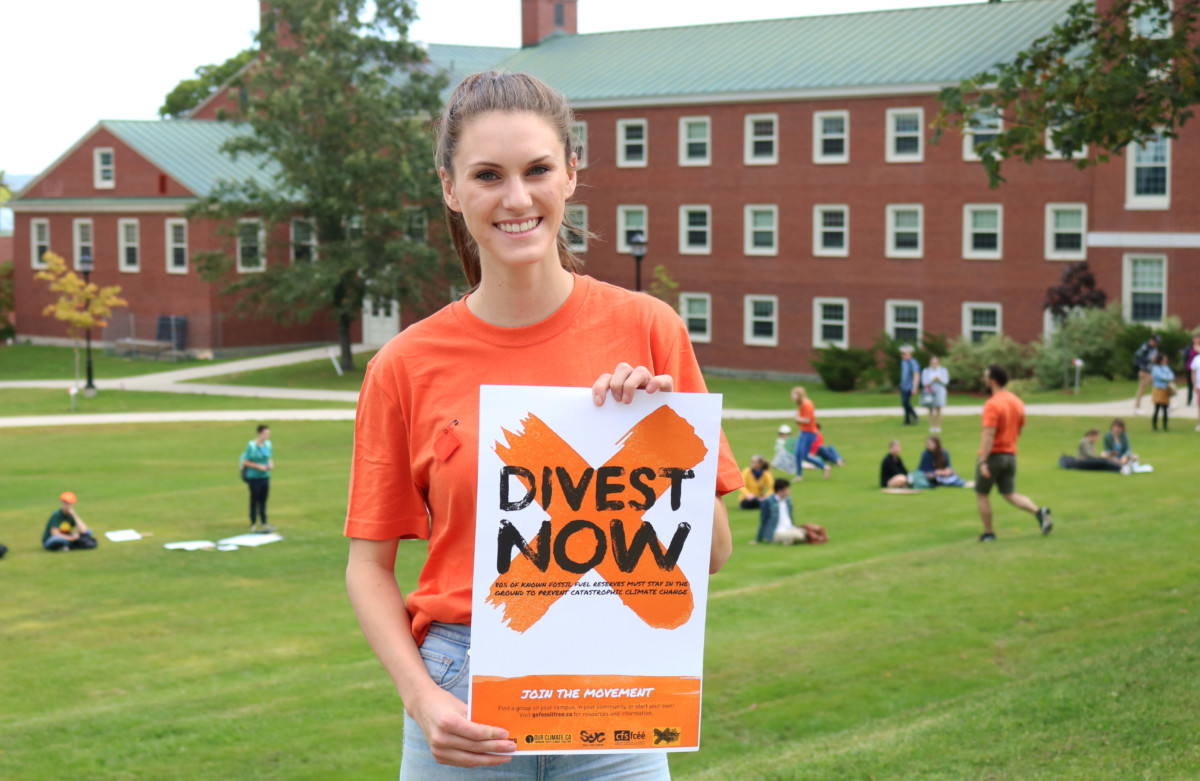Fourth-year student Hannah Moore didn’t know she would find out St. Thomas University invests over $1 million in fossil fuel companies when she took an environment and society class.
Now, she’s demanding the university redirect investments from fossil fuel stocks into more environmentally suitable companies.
Moore will double major in communications and public policy and environment and society. She started the STU Sustainability Divestment Campaign as a class project last year after she heard Tina Oh speak about environmental activism at STU. Oh has been a Canadian youth delegate for the United Nations Framework Convention on Climate Change for the last two years and led the divestment campaign at Mount Allison University.
“She really inspired me to take direct action on campus,” Moore said.
Moore continued with the campaign through the STU Sustainability club this year, which has 15 members.
According to Moore, STU administration invests over $20 million per year in stocks to gain income for the university. Out of that money, over $1 million is invested in fossil fuel companies, she said.
Moore filed a right to information request to obtain the information. Jeffrey Carleton, associate vice-president communications at STU, provided her with the university’s investment portfolio, which breaks down their endowment fund and where their money is invested.
“Once I got that I broke it down and I looked at which companies were oil and gas. And when you add up everything, it comes to over a million dollars of our endowment fund invested into oil and gas companies,” she said.
Moore said she was disappointed but not surprised when she discovered the results of the right to information request.
“This is an issue at almost every single university. They invest in a range of industries and sectors to ‘diversify’ the investment portfolio, but this almost always means investing oil and gas companies,” she said via email.
In an interview with The Aquinian, Carleton said the university would need to review the endowment fund to confirm the figures.
Moore presented a motion in favour of the divestment campaign to the St. Thomas University Students’ Union’s Student Representative Council and STU’s Faculty Association. Both groups passed the motion unanimously on March 31 and April 11, respectively.
“These were very two important accomplishments of our campaign because it shows the student body and the faculty at STU support the divestment and want to see it,” said Moore.
Since last week, STU Sustainability has circulated a petition to students, staff, faculty and alumni of STU and UNB to collect signatures that support diverting funds away from fossil fuels. So far it has over 200 signatures, which were collected at the Fredericton Climate Strike on Friday.
Carleton said the university has not received any communication from the students with regards to the issue of divestment, except for a right to information request in February, where students were given information on the university’s investment portfolio.
“I can’t be in a position to prejudge what the university will do until such time as I see what the request is from this particular group,” he said.
Moore said STU Sustainability will present the petition to STU’s board of governors at the end of this semester or the beginning of next one.
She believes it’s unethical that STU teaches her skills to go out and make a change in the world while profiting off of the very industry that is driving the climate crisis.
“As a liberal arts university that claims to form the leaders of tomorrow, our administration should be more aware of where they are putting their money, and who they profit from,” she said.
Moore said she’s feeling good about the progress of the petition.
“We have only been circulating it for a week and have already seen a lot of interest and support from students, staff and faculty,” she said.
Moore said other universities are working on their divestment campaigns. The University of New Brunswick launched their campaign this year. Mount Allison and Dalhousie have divestment campaigns as well.
“It is exciting to see this student mobilization and activism happening at other schools around us, and I hope that it shows our university’s administration that this is an issue which many students care about and want to see a change in.”
With files from Jerry-Faye Flatt and Diana Chávez

